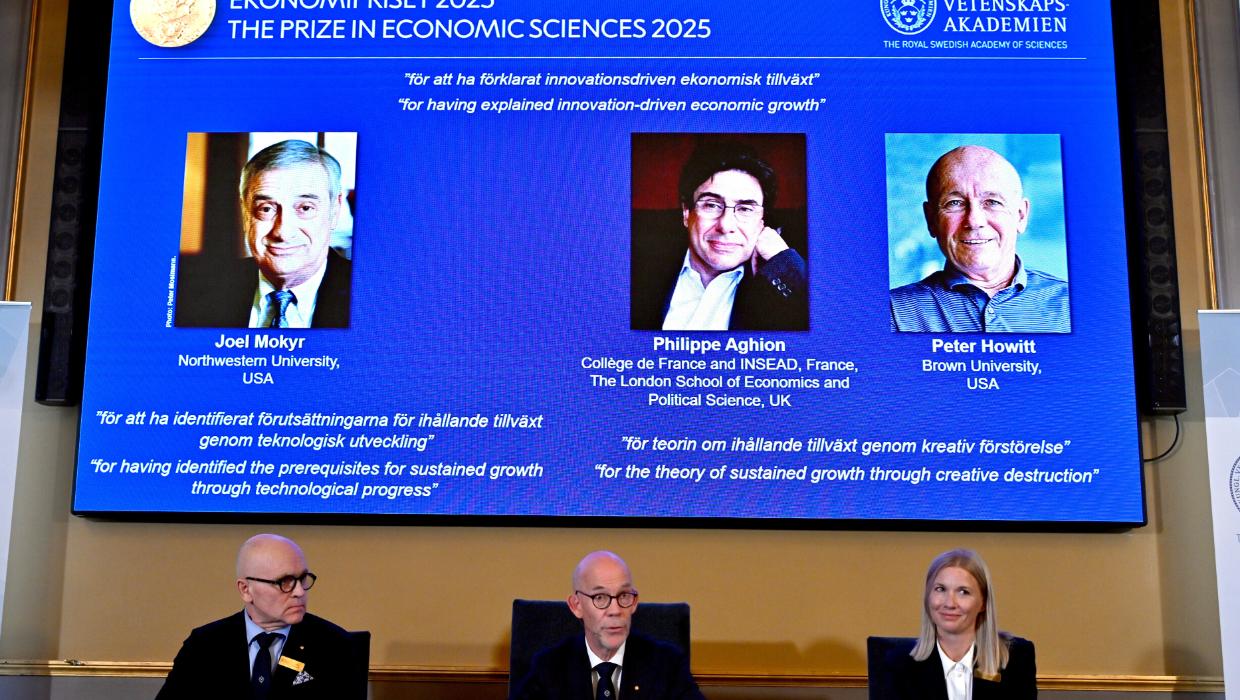Science
Nobel Prize in Economics Awarded for Insights on Creative Destruction

Three researchers were awarded the Nobel Memorial Prize in Economic Sciences on October 9, 2023, for their significant contributions to understanding the dynamics of business innovation and its impact on economic growth. The laureates, Joel Mokyr, Philippe Aghion, and Peter Howitt, explored the concept of “creative destruction,” which describes how new products and technologies can supplant older businesses, ultimately fostering economic advancement and enhancing human welfare.
The Nobel committee recognized Mokyr, a Dutch-born economist at Northwestern University, Aghion, who is affiliated with Collège de France and the London School of Economics, and Howitt, a Canadian-born researcher at Brown University, for their pivotal work in clarifying and quantifying this crucial economic process. Their findings resonate with the historical context of innovation, from the advent of steam locomotives to the impact of e-commerce on traditional retail.
Understanding Creative Destruction
The concept of creative destruction, originally articulated by economist Joseph Schumpeter in his 1942 book, “Capitalism, Socialism and Democracy,” has been instrumental in shaping economic thought. Schumpeter referred to it as “the essential fact about capitalism,” emphasizing the necessity for innovation to drive economic progress. The Nobel committee highlighted Mokyr’s assertion that understanding why innovations succeed is vital for fostering a self-sustaining cycle of technological advancement.
Aghion and Howitt contributed to this understanding through a complex mathematical model introduced in a 1992 article. Their research illustrated how markets dominated by a few large companies could stifle innovation and impede growth, a concern particularly relevant in industries such as telecommunications and social media. The laureates advocated for policies that support workers affected by technological shifts while promoting social mobility, ensuring that individuals can pursue opportunities regardless of their family background.
Their insights emphasize that while innovations may lead to short-term job displacement, they also create new roles and opportunities. The Nobel committee underscored the importance of sustaining mechanisms that facilitate creative destruction to prevent potential economic stagnation.
Implications for Future Growth
The laureates’ work has significant implications for economic policy, particularly in Europe, which faces a growing productivity gap with the United States in digital technology. Aghion noted the urgency of fostering an environment conducive to innovation, stressing the need for increased research funding and venture capital to translate ideas into viable businesses.
Mokyr, known for his optimistic outlook on technological advancements, countered the sentiment that recent innovations lack the economic impact of earlier breakthroughs. He pointed to services like Spotify as examples of transformative innovations that, despite being difficult to quantify economically, provide substantial benefits to consumers.
The discussions surrounding artificial intelligence (AI) also featured prominently in the laureates’ reflections. Aghion expressed his belief in the immense growth potential of AI, contingent upon the right institutional frameworks and policies. He argued that fostering competition is crucial, as established players often navigate regulations more adeptly, potentially hindering new entrants into the market. Mokyr dismissed fears of AI leading to human obsolescence, describing it instead as a powerful tool for enhancing productivity and enabling more engaging work.
The Nobel Prize, amounting to 11 million Swedish kronor (approximately $2.02 million), is split between Mokyr, who receives half, while Aghion and Howitt share the remaining portion. Each laureate also receives an 18-carat gold medal and a diploma. The economics prize is formally known as the Bank of Sweden Prize in Economic Sciences in Memory of Alfred Nobel, established in 1968.
As the world grapples with rapid technological advancements, the insights of Mokyr, Aghion, and Howitt will undoubtedly play a crucial role in shaping future economic policies and fostering an environment where innovation thrives. Their work not only sheds light on the mechanics of economic growth but also serves as a reminder of the importance of adaptability in an ever-evolving landscape.
-

 World4 months ago
World4 months agoTest Your Knowledge: Take the Herald’s Afternoon Quiz Today
-

 Sports4 months ago
Sports4 months agoPM Faces Backlash from Fans During Netball Trophy Ceremony
-

 Lifestyle4 months ago
Lifestyle4 months agoDunedin Designers Win Top Award at Hokonui Fashion Event
-

 Entertainment4 months ago
Entertainment4 months agoExperience the Excitement of ‘Chief of War’ in Oʻahu
-

 Sports4 months ago
Sports4 months agoLiam Lawson Launches New Era for Racing Bulls with Strong Start
-

 World5 months ago
World5 months agoCoalition Forms to Preserve Māori Wards in Hawke’s Bay
-

 Health4 months ago
Health4 months agoWalking Faster Offers Major Health Benefits for Older Adults
-

 Lifestyle4 months ago
Lifestyle4 months agoDisney Fan Reveals Dress Code Tips for Park Visitors
-

 Politics4 months ago
Politics4 months agoScots Rally with Humor and Music to Protest Trump’s Visit
-

 Top Stories5 months ago
Top Stories5 months agoUK and India Finalize Trade Deal to Boost Economic Ties
-

 Health2 months ago
Health2 months agoRadio Host Jay-Jay Feeney’s Partner Secures Visa to Stay in NZ
-

 World5 months ago
World5 months agoHuntly Begins Water Pipe Flushing to Resolve Brown Water Issue









